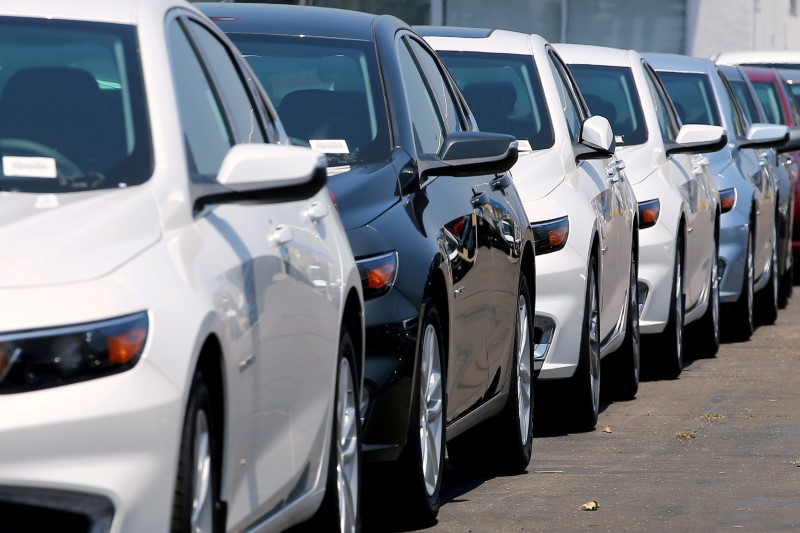By Nick Carey and Ben Klayman
DETROIT (Reuters) - When Detroit's automakers report earnings on Wednesday, they are likely to highlight escalating tariffs and use the opportunity to warn investors of far greater pain ahead should U.S. President Donald Trump impose broader tariffs on the industry's vehicles and parts, consultants and analysts said.
"The automakers really want to get that narrative out there," said Jeff Schuster, president for the Americas at consultancy LMC Automotive, who stressed it is unusual for General Motors Co (N:GM), Ford Motor Co (N:F) and Fiat Chrysler Automobiles NV (FCA) (MI:FCHA) to post quarterly earnings on the same day.
"All three automakers are on the same page with tariffs," he added. "They can demonstrate the impact so far and warn about the risks of taking this further."
The shares of the Detroit Three automakers have been drifting down as Trump has escalated trade threats against China and Europe.
So far, in a bid to reduce America's trade deficit with China and protect U.S. industries, Trump has imposed tariffs on steel and aluminum imports, and on a range of Chinese goods including Chinese-made vehicles, starting July 6. China has responded with tariffs of its own on U.S. goods, including vehicles.
The metals tariffs have pushed up steel and aluminum prices, raising costs and concerns in the auto industry, which expects vehicles sales to decline in 2018.
Early this year, even before tariffs became a reality, Ford warned that rising aluminum and steel costs would hurt 2018 profits.
"On the expense side, those extra costs are going to eat into automakers' profit margins," said Cox Automotive analyst Michelle Krebs. "There's little room to pass those costs onto consumers."
Detroit's automakers also face rising costs on specific models thanks to the tit-for-tat tariffs with China.
GM, for instance, imports the Buick Envision from China, but has not yet said whether a 25 percent tariff will force it to raise prices on the SUV in the United States.
Ford faces a difficult situation in China, with sales down 22 percent in the first five months of the year.
The company's luxury Lincoln models are all imported to China from the United States, and Ford has said it is not planning price hikes for now.
With Chinese sales already cratering, price hikes are seen as a tough sell for Ford.
"Lincoln specifically will be stillborn in China if they don't eat those duties and they are significant," said industry consultant and former GM executive Warren Browne.
But altogether, these margin hits are seen as small compared to the effect of sweeping tariffs on imported vehicles and parts that Trump has threatened.
U.S. Commerce Secretary Wilbur Ross said on Thursday it was "too early" to say if the administration would impose the tariffs, even as many automakers think it is a foregone conclusion.
Administration officials have said the potential tariffs are in part designed to win concessions during the ongoing renegotiation of the North American Free Trade Agreement (NAFTA) with Canada and Mexico.
About 40 percent of the content in GM's U.S.-sold vehicles comes from outside the United States, while that figure is 45 percent for FCA and 20 percent for Ford, according to data from research firm Edmunds.com.
"The problems the automakers currently face are a drop in the bucket compared to what could be coming," LMC's Schuster said.
GM has already warned that higher tariffs on imported vehicles under consideration by Trump's administration could cost jobs and lead to a "a smaller GM" while isolating U.S. businesses from the global market.
A group representing major automakers said on Thursday that imposing tariffs of 25 percent on imported cars and parts would raise the price of U.S. vehicles by $83 billion annually and cost hundreds of thousands of jobs.
Because of the U.S.-China trade war, Germany's Daimler (DE:DAIGn) last month cut its 2018 profit forecast, warning sales of its Mercedes-Benz cars would be hurt, and BMW (DE:BMWG) said it was looking at "strategic options."
There is also the risk Trump might unilaterally withdraw from NAFTA. Boston Consulting Group last year estimated U.S. tariffs in the range of 20 percent to 35 percent would add $16 billion to $27 billion annually to costs at automakers and their suppliers if the U.S. left NAFTA.

"That would be a disaster, both short term and long term," said Browne, who expects Detroit's automakers to address these issues on earnings calls to prepare investors and warn Washington. "Look for them to be very vocal."